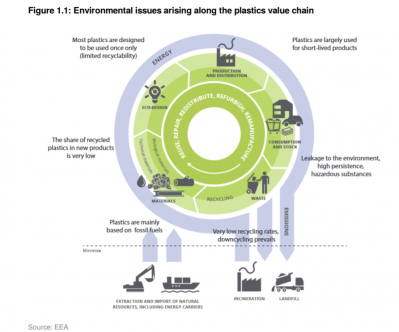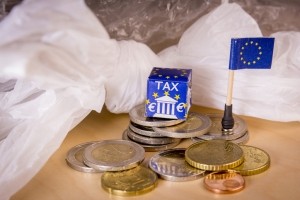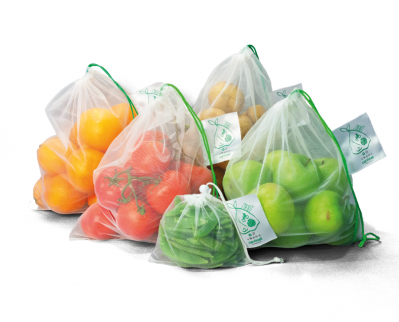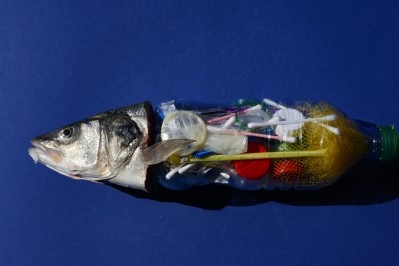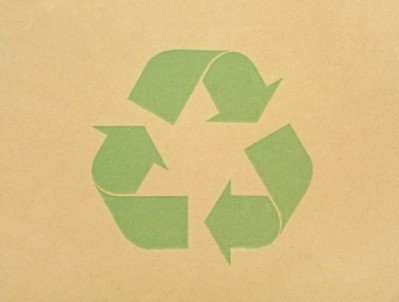Plastic waste ‘state of play’ reveals just 9 countries have specific prevention targets
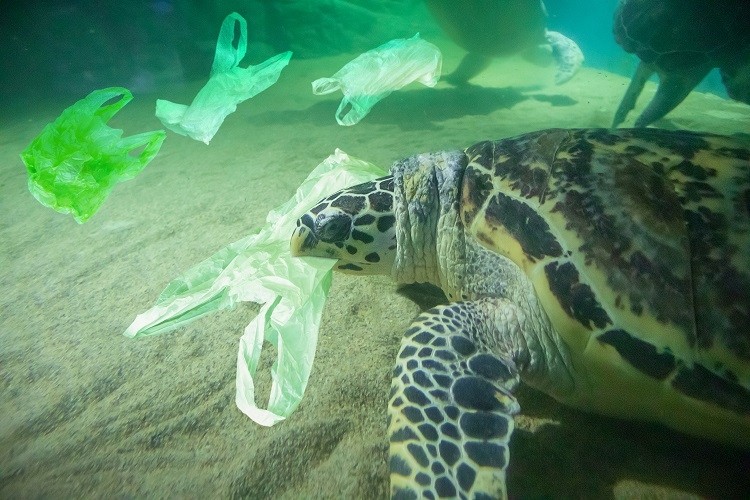
Plastics, which are predominantly used in packaging, and in building and constructing sectors, are regarded a miracle product. They are versatile, lightweight, and durable, and can be manufactured for a vast array of applications.
Yet plastic is notoriously unstable, and plastic waste a growing concern. Recycling capacities have not kept up with the increasing production of the plastics around the world, and in Europe, just 30% of plastic waste is collected for recycling. When incinerated, plastic waste produces 400 million tonnes of carbon dioxide equivalent per year.
The majority of European countries have adopted measures designed to combat plastic waste across the bloc, all of which have been analysed by the European Environment Agency in its latest report.
State of play
The report surveys national and regional waste prevention programmes across 27 Member States – Cyprus has not adopted a waste prevention programme – plus Iceland, Norway, Switzerland and Turkey.
While the European Environment Agency applauds initiatives designed to stamp out single-use plastics, such as charging consumers for plastic shopping bags, it concludes that on the whole, countries lack concrete targets supported by relevant indicators: “Concrete targets enable countries to intensify their efforts to prevent waste, monitor them against a benchmark and define appropriate indicators.
“More importantly, concrete targets for waste prevention help in the selection of a suitable spectrum of measures by providing structure and content to the potentially adopted measures.”
Indeed, the report revealed that just nine countries had explicit targets in place for plastic waste prevention: Switzerland, Austria, Belgium, France, Romania, UK, Estonia, Lithuania, and Sweden.
Austria, Belgium, France, Romania and UK have implemented absolute numerical targets per kilogram of waste reduction, or percentage reduction compared to baseline figures. Estonia and Lithuania have ‘decoupling targets’, which relate to economic indicators, and Sweden has adopted a reduction target combined with a quantitative target. Both Romania and the UK have set additional quantitative targets.
The report also found that plastic waste has been declared a priority waste stream in nearly half of the European Economic Area (EEA) member countries. Indeed, of the 173 waste prevention measures identified, more than 100 cover the production phase of plastic products. 69 address the consumption phase.
Plastics: The numbers
- In 2017, the demand for plastics in the EU-28 was close to 52 million tonnes – an increase from 46 million tonnes in 2010.
- Global production of plastics reached 348 million tonnes in 2017, an extra 13 million tonnes compared to 2016.
- Plastic production has harmful impacts on the environment and climate. Estimates put the
- Only nine countries have explicit waste prevention targets included in their prevention programmes.
Source: European Environment Agency
The agency noted that “clear and coherent targets” - which it said can help to drive innovation and improve waste practices - are still lacking for most product groups.
Good practice
The report picked out good practice examples present in France and the UK that include both regulatory initiatives and stakeholder agreements.
In France, for example, regulations aim to prevent overpackaging, promote the use of reusable packaging, and market easily recyclable packaging.
In the UK, the British Government has announced a ban on the distribution and sale of plastic straws, drink stirrers and plastic-stemmed cotton buds in England. And in Scotland, the manufacture or sale of rinse-off personal care products containing plastic micro-beads have been outlawed. The maximum penalty is set at two years’ imprisonment or a fine of £5,000.
Plastic bag round-up
The report also details national initiatives that aim to limit the use, and purchase of, plastic bags at the retail level.
In Denmark, for example, a ‘green tax’ on packaging and plastic bags covers all bags with a capacity of 5 litres or less that could be replaced by a cloth or net alternative. Consumers pay between 2-3.50DKK per bag. The ‘green tax’ initiative has halved consumption from around 800 million bags to 400 million bags per year.
As of 2019, the mandatory environmental fee of €0.03 per lightweight plastic bag has increased to €0.07 in Greece. The revenue helps fund the production, distribution and promotion of reusable, biodegradable and compostable bags. According to the European Environment Agency, the tax has reduced the use of lightweight plastic carrier bags by 80% in larger stores, such as supermarkets.
Portugal has seen the use of plastic bags in stores and supermarkets reduce by 90% since it adopted a Green Taxation Reform – charging consumers €0.10 per lightweight plastic bag – in 2015.
In Sweden, anyone selling or giving away plastic bags is required by law to provide information about how plastic bags affect the environment. Supermarkets charge between €0.2-0.5 per plastic bag. One year on from enforcement, the legislation has reduced consumption by 35%.
In the UK, consumers pay £0.05 per plastic bag. In England, customers are estimated to purchase approximately 19 bags per person, compared with 140 bags previously. Scotland, which has seen a reduction of 80%, plans to increase the charge to £0.10.
EU ban on single-use plastic
Last month, the European Council adopted new rules regarding single-use plastics, in an effort to reduce ocean pollution. The legislation sees single-use products made of plastic – for which alternatives exist on the market – banned in all Member States. These include cotton bud sticks, cutlery, plates, straws, stirrers, and sticks for balloons.
Member States have approximately two years to instate the legislation into their national law.
